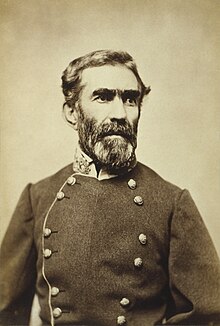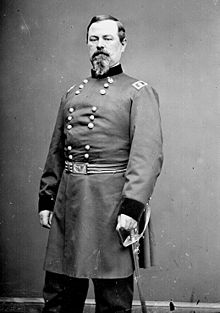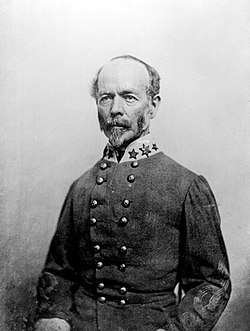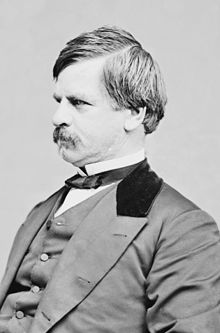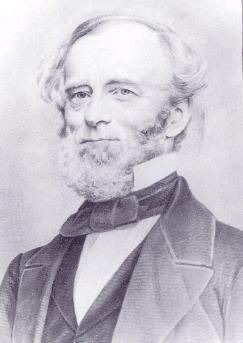 |
| Colonel Benjamin F. Larned |
PAYMASTER-GENERAL'S OFFICE,
November 10, 1862.
Honorable E. M. STANTON,
Secretary of War:
SIR: I have the honor to submit herewith a report of the transactions of
the Pay Department for the fiscal year ending June 30, 1862:
It is shown by the tabular statement herewith* that there remained in
hands of paymasters on June 30, 1861, applicable to payments in the
first quarter of the last fiscal year, the sum of $910,643.34, in
addition to which requisitions have been made on the Treasury in their
favor, and amounts turned over to them from other sources, inclusive of
amounts transferred form one to another or repaid into the Treasury, the
sum of $123,452,919.57, making a total to be accounted for of
$124,363,562.91, as follows:
Payments to regular troops......................... $5,550,039.54
Payments to volunteers............................. 91,116,610.61
Payments to Military Academy....................... 96,739.10
Amount of requisitions not received by the
paymasters on June 30, 1862....................... 16,070,000.00
--------------
-
Total.............................................. 112,833,389.25
Leaving a balance to be accounted for of........... 11,530,173.66
This balance of $11,530,173.66, together with the sum of $16,070,000
mentioned above, as amount of requisitions not received by paymasters on
June 30, 1862, but since drawn out, has been expended in paying the
Army, except the amount of $172,700.51, which stands charged against
seceded paymasters on the books of this office. Of this amount
$16,676.26 remains in the sub-treasury in New York and San Francisco;
$31,098.94 has been carried into the Treasury; $95,871 due on account of
deceased paymasters (of this amount $73,556.75 stands to the credit of
Major Benner in the Treasury, and which the Secretary of the Treasury
was requested August 15, 1862, to have covered into the Treasury; the
balance of $22,314.25 is due by the estate of Major Gaines, who died at
Fort Smith, Ark., in 1860); $21,112 due by paymasters whose appointments
were negatived by the Senate or dismissed by sentence of court-martial.
The accounts of these officers are now under settlement, and on final
adjustment the act of May 15, 1820, makes it the duty of the Comptroller
of the Treasury to proceed against them.
The accounts of Deputy Paymaster-General Ringgold and Paymaster Winston
are stated to the 30th of April only, their returns for May and June
having been lost on steamer Golden Gate and duplicates not yet reached
this office.
The troops have been paid with punctuality whenever funds were furnished
for the purpose, nearly all having been paid to June 30, 1862, and many
of August 31. The immense amounts called for other purposes delayed the
payment to troops in the field longer than
PAYMASTER-GENERAL'S OFFICE,
November 10, 1862.
Honorable E. M. STANTON,
Secretary of War:
SIR: I have the honor to submit herewith a report of the transactions of
the Pay Department for the fiscal year ending June 30, 1862:
It is shown by the tabular statement herewith* that there remained in
hands of paymasters on June 30, 1861, applicable to payments in the
first quarter of the last fiscal year, the sum of $910,643.34, in
addition to which requisitions have been made on the Treasury in their
favor, and amounts turned over to them from other sources, inclusive of
amounts transferred form one to another or repaid into the Treasury, the
sum of $123,452,919.57, making a total to be accounted for of
$124,363,562.91, as follows:
Payments to regular troops......................... $5,550,039.54
Payments to volunteers............................. 91,116,610.61
Payments to Military Academy....................... 96,739.10
Amount of requisitions not received by the
paymasters on June 30, 1862....................... 16,070,000.00
--------------
-
Total.............................................. 112,833,389.25
Leaving a balance to be accounted for of........... 11,530,173.66
This balance of $11,530,173.66, together with the sum of $16,070,000
mentioned above, as amount of requisitions not received by paymasters on
June 30, 1862, but since drawn out, has been expended in paying the
Army, except the amount of $172,700.51, which stands charged against
seceded paymasters on the books of this office. Of this amount
$16,676.26 remains in the sub-treasury in New York and San Francisco;
$31,098.94 has been carried into the Treasury; $95,871 due on account of
deceased paymasters (of this amount $73,556.75 stands to the credit of
Major Benner in the Treasury, and which the Secretary of the Treasury
was requested August 15, 1862, to have covered into the Treasury; the
balance of $22,314.25 is due by the estate of Major Gaines, who died at
Fort Smith, Ark., in 1860); $21,112 due by paymasters whose appointments
were negatived by the Senate or dismissed by sentence of court-martial.
The accounts of these officers are now under settlement, and on final
adjustment the act of May 15, 1820, makes it the duty of the Comptroller
of the Treasury to proceed against them.
The accounts of Deputy Paymaster-General Ringgold and Paymaster Winston
are stated to the 30th of April only, their returns for May and June
having been lost on steamer Golden Gate and duplicates not yet reached
this office.
The troops have been paid with punctuality whenever funds were furnished
for the purpose, nearly all having been paid to June 30, 1862, and many
of August 31. The immense amounts called for other purposes delayed the
payment to troops in the field longer than
PAYMASTER-GENERAL'S OFFICE,
November 10, 1862.
Honorable E. M. STANTON,
Secretary of War:
SIR: I have the honor to submit herewith a report of the transactions of
the Pay Department for the fiscal year ending June 30, 1862:
It is shown by the tabular statement herewith* that there remained in
hands of paymasters on June 30, 1861, applicable to payments in the
first quarter of the last fiscal year, the sum of $910,643.34, in
addition to which requisitions have been made on the Treasury in their
favor, and amounts turned over to them from other sources, inclusive of
amounts transferred form one to another or repaid into the Treasury, the
sum of $123,452,919.57, making a total to be accounted for of
$124,363,562.91, as follows:
Payments to regular troops......................... $5,550,039.54
Payments to volunteers............................. 91,116,610.61
Payments to Military Academy....................... 96,739.10
Amount of requisitions not received by the
paymasters on June 30, 1862....................... 16,070,000.00
--------------
-
Total.............................................. 112,833,389.25
Leaving a balance to be accounted for of........... 11,530,173.66
This balance of $11,530,173.66, together with the sum of $16,070,000
mentioned above, as amount of requisitions not received by paymasters on
June 30, 1862, but since drawn out, has been expended in paying the
Army, except the amount of $172,700.51, which stands charged against
seceded paymasters on the books of this office. Of this amount
$16,676.26 remains in the sub-treasury in New York and San Francisco;
$31,098.94 has been carried into the Treasury; $95,871 due on account of
deceased paymasters (of this amount $73,556.75 stands to the credit of
Major Benner in the Treasury, and which the Secretary of the Treasury
was requested August 15, 1862, to have covered into the Treasury; the
balance of $22,314.25 is due by the estate of Major Gaines, who died at
Fort Smith, Ark., in 1860); $21,112 due by paymasters whose appointments
were negatived by the Senate or dismissed by sentence of court-martial.
The accounts of these officers are now under settlement, and on final
adjustment the act of May 15, 1820, makes it the duty of the Comptroller
of the Treasury to proceed against them.
The accounts of Deputy Paymaster-General Ringgold and Paymaster Winston
are stated to the 30th of April only, their returns for May and June
having been lost on steamer Golden Gate and duplicates not yet reached
this office.
The troops have been paid with punctuality whenever funds were furnished
for the purpose, nearly all having been paid to June 30, 1862, and many
of August 31. The immense amounts called for other purposes delayed the
payment to troops in the field longer than could have been desired, but every effort has been made by this
department under its late and lamented chief,* and since his death, to
distribute the funds furnished as impartially as possible.
Respectfully, your obedient servant,
CARY H. FRY,
Acting Paymaster-General, U. S. Army.
---------------
*Published in House Executive Document No. 1, Thirty-seventh Congress, third session, pp.44-49.
---------------
*Colonel Benjamin F. Larned, who died September 6, 1862.
Official Records, Series III., Vol. 2, Part 1, Page 749.
The task of paying such a large army as the Union mustered was daunting. Although there were delays in making payments, especially early in the war, there was little in the way of abuse of the accounts entrusted to paymasters. Colonel Larned, a veteran of the War of 1812 who headed the paymasters since 1854, passed away in September of 1862 after a long illness. Larned was highly regarded as a Christian gentleman, and on his passing a nine gun salute was fired at all installations and flags were flown at half staff. Badges of mourning were also authorized. As for the $124 million pay in the fiscal year to Union soldiers, this amount would, adjusted for inflation, equal over $1.5 trillion dollars in current terms.

